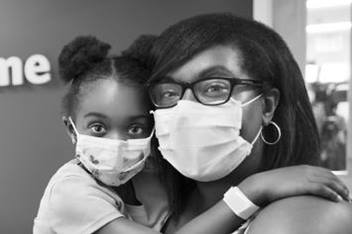COVID-19 Vaccine: Fast Facts

COVID-19 (or Coronavirus) is a virus that is making people very sick. Masks and social distancing help reduce the spread of the virus. Now we have an extra way to protect ourselves from the virus - vaccines! If more people get the vaccine, COVID-19 will not be able to spread as easily, and fewer people will be sick.
The approved vaccines have been shown to reduce the chance of:
― getting so sick you must be in the hospital and
― death from COVID-19.
Fast Facts About The COVID-19 Vaccine
- You cannot get COVID-19 from the vaccine.
It is impossible to get COVID-19 from the vaccine. None of the vaccines contain the entire, alive COVID-19 virus. The vaccine has small portions of inactive virus to teach our bodies how to recognize the COVID-19 virus. The memory of this virus helps our bodies fight back quicker and stronger so even if we are exposed, we do not get very sick. - The COVID-19 vaccines are safe.
All the available vaccines have been proven to be very safe for people. This includes many races and ages. These vaccines went through the same testing process as the vaccines for tetanus and polio. - Anyone can get the COVID-19 vaccine free of charge.
All the authorized vaccines for COVID-19 are FREE to the public. You do not need to show proof of being a US citizen resident when you get the vaccine. - The COVID-19 vaccine will not cause you to become very ill.
You may have brief symptoms as your immune system responds to the vaccine. The most common symptoms reported are arm soreness, headache, tiredness and fever. If you get any symptoms, most only last 1 to 2 days. These symptoms are a sign that your body is building up protection against COVID-19. Some people have no symptoms at all. The vaccine is still working. - Human DNA cannot be changed by the COVID-19 vaccine.
In each of our body’s cells, the genetic information, known as DNA, lives inside the nucleus (the center of the cell). There is a wall on the outside of the nucleus that blocks all the materials used in the vaccine from entering the nucleus. This means that it is physically impossible to change our DNA. - COVID-19 vaccines are safe for women who are breastfeeding.
Women who are breastfeeding are encouraged to the COVID-19 vaccine. The vaccine protects the mother as well as her baby who is too young to get the vaccine. There is no evidence that it will harm either mother or baby. - Women who are now or want to become pregnant in the future are encouraged to get vaccinated against COVID-19.
There is no evidence to suggest that the COVID-19 vaccine is not safe during pregnancy. The risk of getting ill from COVID-19 is much greater than any potential risk from getting the vaccine. - Even if you have already had COVID-19, you should still get the vaccine.
After you get COVID- 19, we do not know how long your body is protected from the virus. Even if you have already tested positive for COVID-19, you can still get infected again. Vaccines cover many different strains and offer the best way to protect you against COVID-19. It takes some time for your immune system to build up protection, so you are considered protected about two weeks after you have finished your vaccine series. - The COVID-19 vaccines do not contain animal products.
None of the approved COVID-19 vaccines contain any animal products, like egg, gelatin or pork. They are kosher, halal and free of preservatives. - Please ask your doctor if you want more information about the COVID-19 vaccines or visit these helpful resources:
― www.NationwideChildrens.org - search COVID-19
― www.CDC.gov/coronavirus
HH-IV-238 ©2021, Nationwide Children’s Hospital


